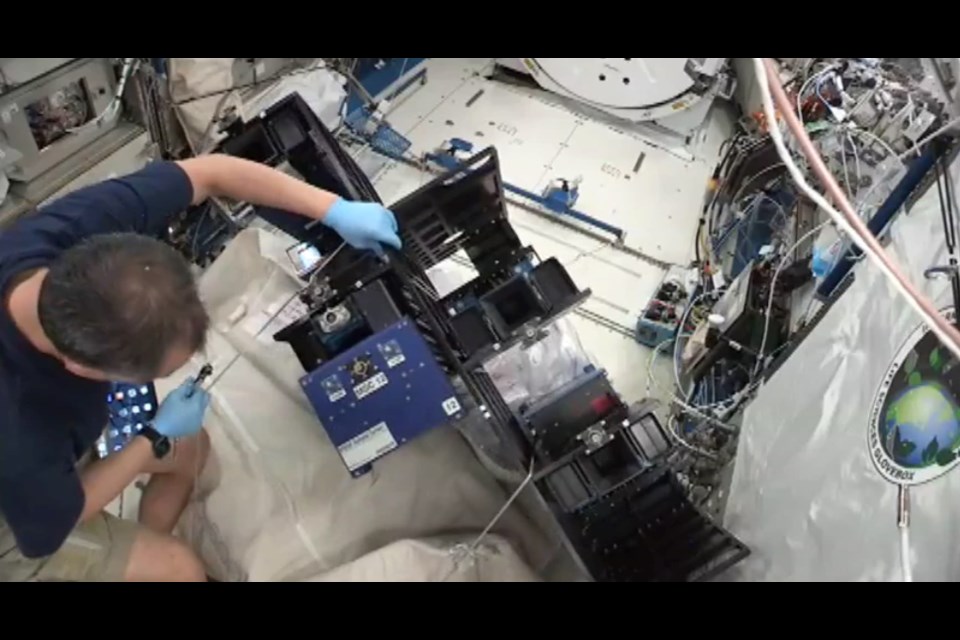Barley seeds sent into the stars by University of Guelph scientists last year have come back down to Earth.
And thanks to a partnership with Scottish whisky maker The Glenlivet, you'll soon be able to get a taste of outer space.
The U of G study is about more than just having a sip of scotch on the rocks.
"This is all in preparation for evaluating the success of agriculture in the harsh environments, especially the lunar systems or Martian," said Mike Dixon, a professor in U of G's school of environmental sciences.
"This is all aimed at trying to figure out the best way to grow food for human space exploration long-term. Food determines how far from Earth we can go, and how long we can stay."
Think Matt Damon's character in the movie The Martian, and the arithmetic he used to grow potatoes. Dixon said that's precisely what they're engaging in at the university.
It builds on a two-decade program called Tomatosphere, sending tomato seeds to space to germinate.
But for barley, the mission was a long time coming for Dixon, a former convenor of a malt whisky tasting society in Guelph.
He initially pitched having barley seeds in space to NASA's Candidate Crop Selection Committee in 1995, but was rejected. But then during a dinner conversation with the new head of NASA's life support program years later, barley became a candidate crop for human space exploration.
The Glenlivet got involved in spring 2019, when Dixon and his brother took a trip to Ireland and Scotland and met up with some senior administrators for the Chivas brothers, who own the distillery.
"They were quite enthusiastic about the marketing potential," Dixon said. "And I, of course was pushing the scientific benefits to be had by developing yet another crop in human space exploration agenda."
A connection was then made with Alpha Space, who operates the Materials International Space Station Experiment (MISSE) Science Carrier, an external platform on the International Space Station, and a deal was worked out to get the seeds onto the platform.
After much delay, the seeds provided by the Chivas brothers were launched into space on Feb. 20, 2021 and returned Jan. 24, 2022.
They got to the ISS, placed in a container and put on the platform and endured "very extensive exposure," from massive temperature swings, to cosmic radiation and zero gravity for 338 days, or 5,408 orbits and almost a quarter million kilometres.
"We were most concerned about the temperature extremes," Dixon said. "We know it gets close to -200 C. And in the sun, almost 200 C, so a huge range of temperatures and we figured that that was going to be a rather extreme challenge."
It was more the scorching temps, and the potential of the barley toasting in the sun, that drew concern from Dixon, adding the barley survived "quite happily" at liquid nitrogen temperatures.
"Nobody expected the seeds to survive," he said. "But low and behold, they germinated."
He believes what may have saved the seeds was the fact they were stored on the underside of the platform, so they were in a shadow the whole time.
"We don't think the seeds ever experienced anything near 200 C," Dixon said. "It was probably more like 40 or 50."
Now, they wait on the environment and radiation data to come back to confirm their suspicions.
Dixon and his team kept some seeds to investigate further, but the vast majority were immediately sent to Scotland to be multiplied and grown in a field of barley to become space scotch.
“We are always looking for new ways to innovate our single malt production and by partnering with the University of Guelph on their trailblazing space experiment, we had the opportunity to do exactly that," Jayne Murphy, marketing director for The Glenlivet said in a news release.
"We are excited to see how the seeds will perform as they are planted, harvested, malted and distilled into one of our iconic single malts. We hope it will produce a new extra-terrestrial express with a wonderful taste.”
It'll take a bit, as the grain will be harvested and malted next year, then distilled and stored in barrels in Scotland for a minimum of three years to become a legal scotch.
Dixon, a scotch-lover himself, can't wait for that first sip.
"That first bottle of space whisky will be special," he said.
